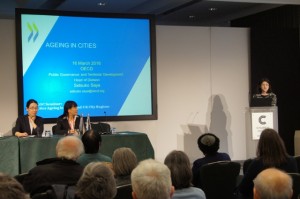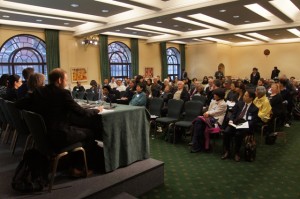Activities and Events
JLGC Seminar
2015/16 London
Better Ageing in Japan and UK City Regions: JLGC Seminar 2016
An annual seminar on ‘Better Ageing in Japan and UK City Regions’ was organised by JLGC on 16 March 2016. This brought together over 70 professionals from UK and Japanese government, business and academia, to examine how, in an era of decentralisation and digitalization, city regions can respond to make the most of opportunities to create age-friendly environments as places that promote active inclusion and opportunity for all.
Gathering in Church House in Westminster, the event was chaired by Simon Parker, Director of the New Local Government Network (NLGN) think tank, who opened in venturing that as the advanced aged society in the world’s most rapidly ageing region, how Japan’s cities develop and cooperate to produce people-centred visions for quality of life will be the subject of international attention, especially after years of fiscal austerity as in the UK.
The seminar began with Setsuko Saya, Head of the Public Governance and Territorial Development Division at the OECD, who outlined the organization’s work in highlighting best practice in the Japanese cities of Yokohama and Toyama as part of its work to align the agenda for smarter ageing with inclusive economic growth. Saya argued that the challenges of ageing mean that national and local government will have to work together in order to address these, with mayoral governance allowing for greater local area cooperation, which is where knowledge can be found and made to impact outside of national strategies. Saya also drew comparison between Japan (where ageing is likely peak in 2035) and the UK (which is constant and rising slowly), arguing that demography can impact negatively on GDP growth. Social inclusiveness in ageing societies is also a measure by which cities can become more resilient, she further outlined. A key debate consists over the incidence of ageing in metropolitan versus rural areas, with policies being directed accordingly in many countries – another issue concerned the ‘optimism’ of mayors who tried to market their cities as “getting younger”, as this is conditional on attracting new industries, which in many cases doesn’t happen and simply creates a ‘winners and losers’ approach which can’t be replicated across a whole country. Another challenge, she argued, was to ensure that ageing policies survive political cycles of mayors and become part of a long-term vision as while mayors change at elections, local citizens do not. Saya also counselled that a “metropolitan scale approach” is needed to bridge the governance gap across city regions, such as mayoral collaboration between municipalities to ensure that transport provision for the elderly exists where people think they live rather than by city boundary, as fragmented governance ultimately reduces urban productivity.
We then heard from Dr Mayumi Hayashi of the Institute of Gerontology at King’s College London and a frequent commentator on ageing society in Japan. Dr Hayashi set out the context behind Japan’s creation of age-friendly and dementia-friendly communities in saying that the country has the world’s fastest ageing population, with a rising proportion (almost 20% by 2025) living alone and a shrinking care workforce combining with rising debt to GDP (242%) meaning that Japan faces an imminent social care crisis. Dr Hayashi then outlined four cutting-edge and imaginative exemplars at city level in Inagi (Tokyo), Wako, Ogaki and Omuta, which could go some way towards addressing these challenges if taken up elsewhere, with all four demonstrating partnership working and co-production between local authorities and businesses, voluntary organizations and community groups. Dr Hayashi concluded in remarking on shared learning opportunities for the way ahead for Japan and the UK.
A ‘Smart Approach for Ageing in Cities’ was set out next by Reiko Shimoda of NEC, who detailed the company’s interest in the agenda and hope to generate optimal solutions for cities as part of its business operations in both the UK and Japan. Shimoda considered that as 70% of the world’s population will live in cities by 2050, NEC could play a part in working up what it refers to as ‘social solutions’ for urbanization and that it hoped to also act as a bridgehead for the smart city movement between Japan and the UK. Shimoda set the scene in considering that as UK local authorities have faced and continue to face unprecedented budget cuts (for instance the London Borough of Barnet’s ‘graph of doom’), the only way that councils can continue to provide a level of service to communities without this funding is to innovate around service delivery through better use of data, efficiency and connectivity, all aspects of NEC’s business. In particular, adapting to ageing provided both the company and its two current UK local authority partners in Bristol and Greenwich with bespoke opportunities to take holistic approaches to technology and the use of data, rather than relying on silo-driven approaches of the past. As well as telecare and telehealth, the business is looking to roll out the use of data collection through sensors and IOT applications for use in the home as tech-enabled goals, she said.
Next we heard from Dr Anna Dixon, Chief Executive of the Centre for Ageing Better, one of seven ‘What Works Centres’ of the UK government which look at evidence-based policy aimed at better preparing for an ageing society. Dr Dixon outlined the relatively new organization’s aims and programmes, including its £80m Big Lottery Fund projects in 14 local areas (including Camden) aimed at reducing social isolation among older people in England. She also detailed that the organization’s work would be informed by learnings from both academic institutions and practice communities, as well as internationally, but would eschew an approach of simply producing “more reports” and instead seek to work with localities to drive forward solutions. Part of this she argued could be seen in its newly-established partnership with the Greater Manchester Combined Authority to develop the GM Ageing Hub, which when rolled out across the 10 local authorities of Greater Manchester would form the UK’s first city regional place-based approach to ageing. This would also be reliant on the UK Age-Friendly Cities Network to share and apply societal approaches to ageing among other UK city regions, though place-based approaches were also being sought in non-metropolitan county areas such as the Isle of Wight, which is seeking to be the UK’s first age-friendly island. She concluded in saying that the centre would also be seeking to look at ageing as a quality of life issue by better understanding how neighbourhoods themselves can be a tool for better inclusion of older people.
Our final speaker for the seminar was introduced by JLGC Director Kazuya Shima, who spoke a few words on the role of CLAIR and its overseas office network in representing and promoting Japan’s cities and regions. Part of this he argued was to bring together networks of local government executives from the UK and Japan through the annual Japan Study Tour, which in 2015 was held in Yamanashi Prefecture (and Tokyo) around the theme of ‘Challenges in Demography: Tackling Ageing Society and Shrinking Populations’.
A participant of the 2015 Study Tour, Richard Elphick (Strategic Commissioner for the London Borough of Camden), then gave his presentation of feedback from the tour in order to inform the seminar of UK-based practice and how learning from Japan could impact on this. He argued that the tour is often seen as inspiring for participants from the UK as the visual impact of Japanese culture and craftsmanship can be found in all aspects of Japanese society, even at government level in a way often not witnessed in the UK. He considered that in both countries, both age and ageing is unevenly distributed but in Japan it is happening faster and more unevenly, with more respect for the elderly characterizing approaches and funding. The UK however has an unprecedented austerity agenda as well as more diversity and history of immigration, while Japan has a very low birthrate (but also comparably and admirably higher levels of public health). He also contrasted the key features of public sector provision in both countries, as well as models of care. While in Japan the debate could be seen as about different housing models capable of accommodating the needs of an ageing society, in the UK he considered that the debate ought to be more focused around the immediate challenge of funding. He concluded in saying that this urgently needed mature debate contrasted with the long termism of Japan and its own local government strategy which takes into account changing demographics.
A lively but brief question and answer session followed the main speakers, chaired by NLGN’s Simon Parker, which took into consideration topics such as active learning, community safety in Japan (as compared to the UK), the role of technology against enduring austerity and, appropriately, what the UK can learn from Japan in anticipation of its own ageing society. Ultimately the perspectives and learnings around enabling older citizens to lead better lives enabled by holding this seminar will continue through JLGC’s individual engagement with the organizations represented by each of the speakers, the connections made in the room at the subsequent reception, and not least future research across 2016.



